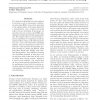109 search results - page 4 / 22 » Policy teaching through reward function learning |
IIE
2007
13 years 7 months ago
2007
We investigate the possibility to apply a known machine learning algorithm of Q-learning in the domain of a Virtual Learning Environment (VLE). It is important in this problem doma...
AAMAS
2010
Springer
13 years 7 months ago
2010
Springer
Abstract In this paper, we present a human-robot teaching framework that uses "virtual" games as a means for adapting a robot to its user through natural interaction in a...
IJCAI
2007
13 years 9 months ago
2007
Inverse Reinforcement Learning (IRL) is the problem of learning the reward function underlying a Markov Decision Process given the dynamics of the system and the behaviour of an e...
NECO
2010
13 years 6 months ago
2010
Most conventional Policy Gradient Reinforcement Learning (PGRL) algorithms neglect (or do not explicitly make use of) a term in the average reward gradient with respect to the pol...
ICML
2002
IEEE
14 years 8 months ago
2002
IEEE
Two notions of optimality have been explored in previous work on hierarchical reinforcement learning (HRL): hierarchical optimality, or the optimal policy in the space defined by ...

